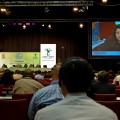The COP15 Hangover, Day 1 at COP16
Tim Hall | November 29, 2010.
So much talk for so little results. The feeling on the first day of COP16 was like a COP15 hangover – the distant lingering memory of the sensation, anticipation, and realization of political reality last year. Rarely was it explicitly referred to, but all in the room could sense that elephant. Unity and responsibility were stressed by all speakers, not wanting to deepen any gulfs left unresolved at the conclusion of COP15.
While the opening plenary speeches were engaging and hopefully conveyed the urgency of the climate crisis, it was nothing new. Rajendra Pachauri of the IPCC quoted material from the 2007 IPCC report, showing how serious the issue and how robust the science. Yet it was tiring that such alarming facts still had to be repeated; that people still don’t comprehend the urgency.
One flaw in the logic displayed at COP16 is the apparent ease with which nations are prepared to reach consensus on adaption yet bicker over mitigation actions. COP President Patricia Espinosa noted in her opening address that governments are within reach of a deal to launch action on adaptation, along with technology transfer and forests – all the small aspects of the Cancun balanced package. It was even suggested that the issue of financing long term climate assistance to developing nations is within reach of resolution. This was promising, as a general commitment to a balanced package of issues could pave the way for a new treaty.
Yet all who sat through the afternoon’s painful deliberations on Kyoto progress surely walked away with an acute sense of the gulf between developed and developing nations. Mitigation is arguably the most important element of a climate agreement, but today progress seemed beyond reach. For hours a back and forth dialogue consisted of verbal backhanding between nations most at risk with least capacity and nations least at risk with most capacity. The G77/China flagged their intention to protest two problems with recent behaviour by developed nations: that the collective emissions of developed nations has risen by 10% since 1990; and that capital flowing into funds set up to assist developing nations have been slow and inadequate.
While only headaches now, these could turn into full blown migraines by the end of week two. Already delegates are staying up into the early hours of the morning negotiating these tricky issues. Some were even prepared to miss the free food, drink and music on offer to welcome them to Mexico.
Whereas Copenhagen was bound by expectations of what it could achieve, Cancun is driven by understandings of what it cannot. And while Copenhagen was ultimately broken by its vaulting ambition, Cancun may well be defined by its limited scope, building a consensus around the foundations.
The most successful COPs have seriously engaged with the climate crisis, worked with key principles, established climate change as a global concern and have attracted considerable media attention. None of these boxes were ticked today in Cancun, and sets a worrying precedent for the next two weeks.
But this is just speculation, only the next two weeks will answer whether Cancun becomes synonymous with success, failure or somewhere in between.
By Tim Hall, photo via the UNFCCC.













comment